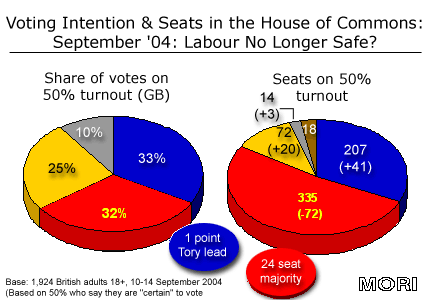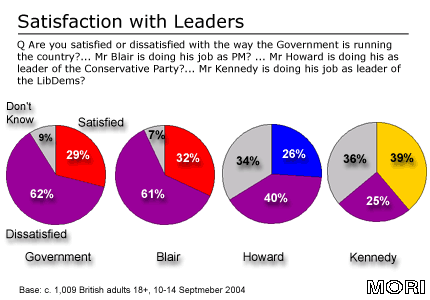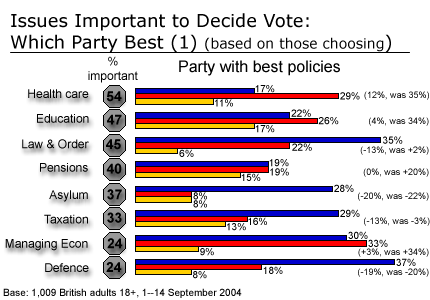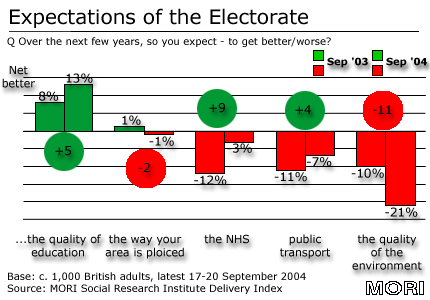Tiptoeing Close To The Edge
The Labour Party at the 1997 general election was rewarded with the biggest landslide since the War. 419 Labour MPs took their seats in the House of Commons across from just 165 Tories and 46 Liberal Democrats and 29 others including 19 from Northern Ireland, an overall majority of 179. Labour won, going away, with a 44 percent share of the vote to the Conservatives' 32 percent and the Liberal Democrats' 17 percent.
Four years later, in 2001, the Conservatives added just a single MP to their benches, while the Liberal Democrats gained six seats, for a Labour overall majority of 167 over all other parties.
It's not going to be like that next time (5th May next year is my best guess of when the next election will be called). The Tories are now at 33 percent, Labour 32, down 10 points from 2001. The Liberal Democrats, who only polled 18.8 in 2001, have consistently hit 20 and more for over a year. On 25 percent, they present a threat to Labour's majority when the election comes, splitting Labour's losses with the Tories.
On these figures, the Liberal Democrats would pick up about 12 seats, but the 10 point drop in Labour support would cause Labour to lose as many as 40 of their current MPs, mostly to the Tories, and mostly Blarites.

Blair is down to under a third of the electorate satisfied with his performance, but then Michael Howard has only one person in four of all electors satisfied with him, and the 'don't knows' are sloping off saying they are dissatisfied with the Tory leader.
Most people are certainly unhappy with Mr Blair, and while more people are dissatisfied with both Blair and Howard, Howard's satisfaction figures among those most likely to vote equal those of Blair, at 31 percent.
According to MORI's analysis for the Fawcett Society, confidence in Blair is now as low as that experienced by Margaret Thatcher in the last 18 months of her premiership.
Charles Kennedy is making much of being the only party leader with more people satisfied than dissatisfied with his leadership of the Liberal Democrats, but when asked which party leader would make the best Prime Minister, Blair is still in first place, Howard in second, and the Liberal Democrat leader running a poor third.

Iraq is playing big in the spontaneous worries of the British electorate, with 36 percent saying that the war is one of the key issues facing the country, ahead even of the usual top issue, the NHS. But when asked which two or three issues people think are the most important to helping them to decide how to vote, health as usual comes top, with 54 percent choosing it from a list, down just 7 points from the '01 election. Education was second, crime third, taxation fourth and pensions fifth. Other than defence, not much has changed in terms of order of importance since 2001.

But analysing those who say that the issue is important to them to decide how to vote, there has been massive changes since the last election. Then Labour had a 35 point margin over the Tories on the health care issue; now it has fallen to 12 points, a 23 point drop; on education, a 30 point drop, on law & order, down 15, on pensions, down 20, even on managing the economy, which he has 'delegated' to the Chancellor, Gordon Brown, down 31 points.
Best news for Labour is the public's increasing optimism that things can indeed only get better, and about time too. Improvement in the quality of education is expected by 13 percent more people than think it won't improve, a jump of 5 points in the past year, and more have hope that the NHS is improving, a nine point improvement year on year.. Also improving is public transport, up 4 points, and the way your area is policed is holding its own. Only in the expectation that the quality of the environment is worse is significantly down, 11 points.

So there's very good news here for the Liberal Democrats, still a long way from hopes to replace the Tories as the official opposition, but up significantly in their poll ratings and the likelihood of more and more Liberal Democrats in the Commons after the next election.
There's much cheer also for the Tories, with the possibility of cracking the 200 Tory MP barrier in the next Parliament, and great improvement in the public's belief that on the issues that people care about the Tories have the best policies. There is also the possibility of a hung Parliament next year, which would certainly contain the Prime Minister's worst excesses, with the Tories firmly the official Opposition, seeing off the threat promised by the Lib Dems.
And some cheer even for Tony Blair, in the certainty that so long as the Liberal Democrats share holds up, and they don't make matters worse, they'll at worst have the most MPs, and still hold the key to No. 10.
Technical details
MORI's Political Monitor is from interviews with a representative sample of 1,924 adults aged 18+ at 192 sampling points across Great Britain, in-home on 10-14th September 2004. MORI's Delivery Index is from interviews among 964 adults conducted on 17-20th September. Data are weighted in each survey to match the profile of the population.



